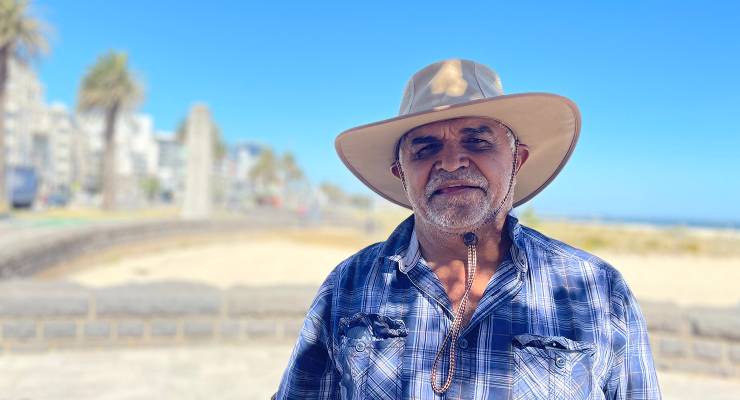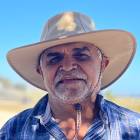
People say Australia is the lucky country. But lucky for who? Not for the First People of this land.
I am a proud Aboriginal man. I grew up with my family on the Cherbourg Aboriginal settlement in Queensland. The people from this area are known as the Wakka Wakka people, as they lived on both sides of the river. The settlement was built by white people to control Aboriginal people, who were taken off the good land all over Queensland and put on settlements and missions like Cherbourg.
I started working on the settlement when I was just 10, milking cattle. Later I worked as a farmhand and at the sawmill. We worked seven days a week but got paid very little. Our wages were stolen, and my family was given rations by the white people who ran the settlement. Years later, the government had to pay us compensation.
When I got older, I spent years working on the railways in central Queensland. It was hard work, but we needed employment to feed our families. Labouring jobs were the only thing available for us, as a lot of us were not educated in English.
These days I work as an Aboriginal Heritage guide, teaching people about native plants and Aboriginal tools, food and medicine. I teach people what the land means for Aboriginal people and how we look after it. I’m also a DJ at 3KND radio (a dedicated Koorie radio station) and a poet. The radio gives me a platform to speak to our people in truth.
A right to fair support
Recently I took the Australian government to court to lower the pension age for the First People of this country.
The government wants people like me to work until I am 67, despite the fact that Aboriginal and Torres Strait Islander people have a lower life expectancy. Indigenous men are likely to live only to 71, 8.6 years fewer than non-Indigenous men. Indigenous women are expected to live only until 75, 7.8 years fewer than Indigenous women.
White people live longer because they haven’t lost what we have lost. We are often lucky to hit 50 or 60, although I’ve seen a lot of my people dying at a very early age — even as young as 30.
This is about acknowledging what has happened in this country. We didn’t have a problem; a problem came here. So many things that Aboriginal people are suffering from today are because of how we have been treated since colonisation. Europeans brought their diseases, their animals, their guns and their poison, and they ripped this country apart.
On the settlement, we ate a lot of food that was no good for our bodies. So many of us were locked away and stripped of our language. A lot of massacres happened here, and many children were taken away from their families.
Settlers today can say none of this is their problem. But it is.
Equal access
More than a decade ago, the Australian government promised to “Close the Gap” in life expectancy between Aboriginal and non-Indigenous people. We are not making much progress: governments are all talk and no action, and there have been so many lies. If it were the other way around, and white people were dying too young, they would have fixed this already — they wouldn’t let it happen.
Everywhere I go, people who are younger than me call me uncle. It’s a sign of respect, because everything is passed on to our young people from their ancestors and their elders. It’s part of our culture and identity to respect our elders.
The pension is an important part of caring for and looking after our people when they can’t work any more. I don’t earn a lot of money and I don’t get any Centrelink. If our people can access the pension earlier it would be a big thing for me and for all our old people. The pension means people can live with pride.
Giving Aboriginal people fair and equal access to the pension is about telling the truth. Things will never get better unless we acknowledge something is wrong. Truth and accountability are important.
I want all people to understand the history of what has happened here and how Aboriginal people are still impacted by it. Our language, our culture and our identity come from this land. It’s not about blaming anyone; it’s about understanding.
I took this legal action because I wanted to stand up for my people. This case is for Aboriginal people all over.
Otherwise, how can we call this the lucky country? I would still like to know: lucky for whom?
Should First Nations people get their pension earlier than non-Indigenous Australians? Let us know by writing to letters@crikey.com.au. Please include your full name to be considered for publication. We reserve the right to edit for length and clarity.








I admire your actions Uncle Dennis. And, thank-you for writing this article the way you have. Anyone reading with an open mind can surely see (as you have said), “It’s not about blaming anyone; it’s about understanding”.
Thanks for speaking out and taking a stand, Dennis. This white fella is listening.
I don’t disagree with anything Uncle Dennis says about the circumstances and history of Aboriginal people and the effect that has in comparison to other Australians. But implementing a different pension age for Aboriginal people would be a nightmare in practice, no matter how justified in theory. A single person who gets the full age pension receives $25,328 a year currently. So if, for example, the pension age for Aboriginal people becomes 63 while everyone else waits to 67, that would be over $100,000 more for all those eligible (if they live to at least 67). That’s a huge new incentive to claim being Aboriginal, and it would be wise to expect a colossal increase in the number of Australians who realise or decide that they are, in fact, Aboriginal. How would their claims be tested and assessed? How could those whose claim failed mount an appeal if they felt hard done by? At present it can be managed well enough because the stakes are not so very high and the numbers trying to prove they are Aboriginal are manageable, but with such a change to pensions this would surely require a substantial new bureaucracy to administer fairly. Would it resemble the operation of the South African Population Registration Act of 1950, which resulted in every South African being assigned a race, and an annual declaration of reclassification decisions which moved individual citizens from one race to another? Without such robust measures it would surely degenerate quickly into a ghastly mess with those trying to claim Aboriginal status being willing to bribe and threaten in order to win the financial prize on offer.
Apart from that it would also be necessary to explain why others who also have a reduced life expectancy but are not Aboriginal should not also get the age pension earlier, and why someone who is Aboriginal but has at least as much life expectancy as an average Australian should get the pension earlier. Presumably the answer is that the pension age reduction would be plain racial discrimination. Ok, it would be trying to balance the harmful discrimination of the past with a measure of positive discrimination, but it still entrenches discrimination.
This idea also does nothing for all those who die before even the reduced pension age. Why do they get nothing?
Closing the gap would be better, but lowering the age in the interim would also be deserved I feel.
Deserved, fine. Feels right, fine. But how does that fix any of the problems the change would cause?
DNA testing.
That would be an objective test with a clear result, which would make it very attractive up to a point. It would also be the clearest example of eugenic theories in action since the 1930s and it would require everyone to agree that being Aboirginal is entirely a matter of genetics. The far right would be over the moon, and the consequences would profound.
Why not raise the rate of unemployment benefits to the same as the pension?
That is an idea of dangerous common sense. It would mean that the undeserving poor (those on Newstart) would be given the same advantages as the deserving poor (those who have retired, presumably after a lifetime of working to make our Betters even wealthier). Australian politics relies on separating deserving from undeserving, hence Robodebt and other abominations. Be prepared for reporters from News Corpse kicking down your door to drag you before their rabid, late-boomer-conservative audiences for judgement.
Because Pensioners don’t want to compare themselves to “dole bludgers”.
To qualify as Aboriginal for Centerlink purposes you need a certificate of authenticity from the community you were born into, signed and witnessed by those Elders who are familiar with you and your family. Most folks of colour already have that in place. That cuts out many of the scammers, although some will still have a try. Uncle Dennis might have something to add here. I agree with everything else you raise, and it could be an administrative and legal nightmare. But… That isn’t necessarily a reason not to explore the idea.
That’s right, and I agree it seems a sufficient system for qualification at present. I just doubt it could cope with the additional stress of the proposal would add. It would change things beyond recognition, and quite likely not in a good way at all. It needs a lot more thought, and I doubt the age pension can be the right mechanism for what amounts to compensation or reparations.
Leave it at 67 but give access to the disability pension if people cant work. In my work with aboriginal communities The 2 secure benefits are the aged pension and the disability pension. The dole has too many strings attached. Its hard for anybody to manage without being suspended from time to time. Indigenous people really struggle with meeting all the requirements to maintain it or get back on after suspension, which is even harder, if you arent set up with internet, adequate devices and good record keeping for all the paperwork.
“So if, for example, the pension age for Aboriginal people becomes 63 while everyone else waits to 67, that would be over $100,000 more for all those eligible (if they live to at least 67).”
What about at the other end of the spectrum? They sadly die much earlier than non-aboriginal people so unfortunately they’re likely to have a far reduced number of years on the age pension.
Of course indigenous Australians should get the pension earlier, and if not the old age pension, then at least the disability pension (and granting it should be liberal) if they’re not easily physically able to work.
it’s not quite true that the government would have solved the problem if white people were dying earlier. People, both white and black, are dying earlier because junk food manufacturers and fast food restaurant chains are unregulated and allowed to freely peddle their toxic products as healthy, causing the obesity epidemic and increasing its associated diseases.
Every Australian should get the disability pension if they’re not easily physically able to work. And while we’re at it, lower the aged pension age for Indigenous Australians to 55. FFS we can afford it, we’re one of the richest countries in the world.
If the aged pension for indigenous Australians was lowered in line with their reduced life expectancy, and reviewed in like manner every year, it would finally provide incentives for the unempathetic bean counters to Close the Gap. Actual progress on indigenous life expectancy, and in the meantime, pensions to be accessed sooner in life. Win-win.